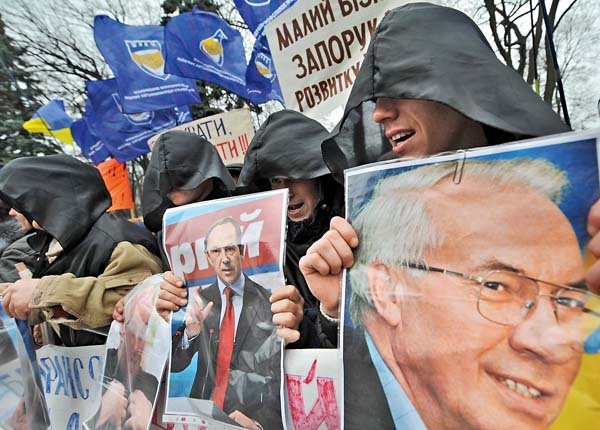Background
The European Union is divided on its approach towards Ukraine, a country seen as deeply European in its culture and history but also as having gravitated towards Russia since the 2010 election of President Viktor Yanukovych, the leader of the Party of the Regions.
The mixed message of a recent European parliament resolution is that lawmakers back Ukraine’s EU membership aspirations but warn of “worrying signs of the erosion of democracy and pluralism.”
Plutocracy is rule by the wealthy. Oligarchy, which is present in Russia and in some Eastern countries, refers to the control of the state by a few prominent wealthy families. The combination of plutocracy and oligarchy is also known as plutarchy.
The Ukrainian government appears to be the richest in the world, according to details disclosed during a public event held in Brussels, organized by the European Union-Ukraine Business Council and attended by Ukrainian diplomats.
Richest officials?
Speaking on behalf of a leading Ukrainian online news portal which enjoys a fast-growing readership, the site’s editor Sonia Koshkina, considered one of Ukraine’s top journalists, pointed to the wealth of individual cabinet members, but also to the tricks used by other cabinet members to avoid publicly disclosing their millions.
Koshkina’s www.lb.ua website is part of the Gorshenin Group, which consists of an analytical centre, a consultancy and a media network.
She said that at least five of the 16 cabinet members are multi-millionaires, and one is a billionaire.
According to Ukrainian magazine Focus, First Deputy Prime Minister Andriy Klyuyev possesses – together with his brother Serhiy, who is an member of parliament from the ruling Party of the Regions – $900.8 million, through one of the largest industrial-investment corporations in Ukraine, Ukrpidshypnyk.

Tax protesters hold placards showing Ukraine’s Prime Minister Mykola Azarov and other ministers shout slogans during a rally in front of Ukraine’s parliament in Kyiv on Nov. 18. (AFP)
Deputy Prime Minister and Infrastructure Minister Borys Kolesnikov’s fortune is estimated at $254 million in 2010 and at $292.5 million in 2011, after he became minister. His business interests range from confectionery to football, and he is in charge of preparations for the 2012 European Football Championships.
Deputy Prime Minister and Social Minister Sergiy Tigipko has an estimated fortune of $795.5 million in 2011, increasing from $223.6 million the previous year. His business is mainly steel and rail-car building.
Emergencies Minister Viktor Baloha’s fortune is estimated by some at $550 million. But his major assets – some 14 companies involved in trade – are declared to belong to his wife, Oksana.
Ecology Minister Mykola Zlochevsky appears to be an interesting case. He declared only 30,780 dollars of income in 2009.
However, he also acknowledges ownership of a 1,000 square-meter house, a Rolls-Royce and a Bentley. But this did not prevent him from taking $4,271 of financial assistance from the state.
Several ministers, including Prime Minister Mykola Azarov, reportedly have considerable wealth registered with their sons or closer relatives. Often ministers have business interests in the same field as their official activities.
Mykhailo Tabachnyk, brother of Education Minister Dmytro Tabachnyk, is reportedly one of the owners of the Intersport company, which owns the land earmarked for the construction of a sport complex needed for the 2012 football championships. According to sources, Intersport leases the land to the ministry, although the value of the lease has not been disclosed.
Sonia Koshkina (which is her pen name; her real name is Ksenia Vasilenko) said that despite the complexity of their spheres of influence, the ministers seemingly manage to coexist and avoid conflicting with one another.
Should arbitration be required then the arbiter is President Viktor Yanukovych, and not the prime minister, who has much less power, she explained.
There are also important power players outside the government, Koshkina said, citing as an example the head of the country’s secret services, Valeriy Khoroshkovsky.
He does not hide the fact that he is a millionaire and that he controls the TV channel with the nation’s biggest audience, she explained.
Despite media revelations, conflicts of interest in Ukraine do not appear to bother anyone, Koshkina said.
The Western audience present at the event seemed surprised both by the revelations and the fact that Ukrainian diplomats present in no way attempted to counter or challenge the facts presented.
Leaders’ response
After the event, EurActiv asked a Kyiv official to comment on alleged plutocracy in Ukraine.
At his insistence that his name should not be made public, the official said:
“The [ministers’] wealth is common knowledge, especially for readers in Ukraine. Another question is whether this fact somehow influences the reforms the government has launched.
It is true that there is general public discontent with high prices and inflation, which many associate with the new government, but it is also true that these can be direct consequences of the deep crisis Ukraine faced in 2009, and it would be strange to expect an economic boom.
The reforms were needed, and the biggest part of Ukraine’s population agrees with this. Another question is how deep and comprehensive will they be. This is an open question for the moment.
Per se, and especially in the post-crisis situation, I don’t think that the oligarchs ruling is something bad for Ukraine. The real problem is that we don’t have a strong and united opposition which would propose programs, ideas etc.
Everyone, [former Prime Minister Yulia] Tymoshenko, [former presidential candidate Arseniy] Yatseniuk, etc. claim themselves to be opposition leaders, but so far [they have made] no proposals, just struggles for future election dividends. Somehow it resembles the Italian situation.”
Georgi Gotev is senior editor at EurActiv, a Belgian foundation and publication which aims to identify sources of information and intelligence on European Union policies and their impact. This article was originally published by the group’s website, www.Euractiv.com.
